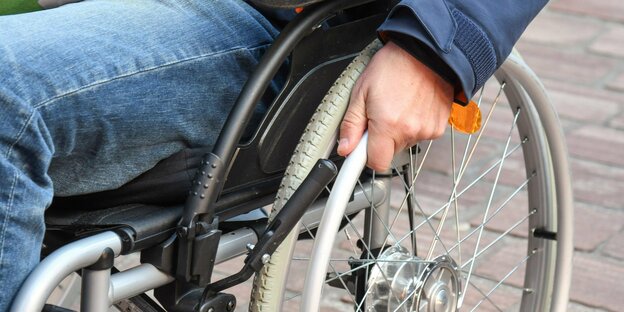The new citizenship law facilitates naturalization, but it does not only exclude disabled people. That could be unconstitutional.

The new citizenship law harms people with disabilities Photo: Winfried Rothermel/imago
The traffic light coalition facilitates naturalization with a legal reform: in the future it will be possible to obtain a German passport after only five years of residence; so far it has been eight years. And it is no longer necessary for a person to renounce their previous citizenship in order to obtain German citizenship. As positive as these changes are, even more frightening are the changes that result in something that almost no one associates with citizenship law: discrimination against people with disabilities.
The previous citizenship law stipulated that people who wish to naturalize can support themselves and their dependent family members without having to rely on benefits such as the citizen's allowance or similar social benefits. However, if a person was dependent on social benefits and “was not responsible for their use,” this did not lead to exclusion from naturalization.
“Not responsible for claiming benefits” translates to: You are dependent on social benefits because full-time work is not possible due to caring for family members. This applies to single parents who cannot work full time due to child care, a widowed parent whose child cannot stay in school all day due to ADHD, or family caregivers.
But it also affects people with disabilities who cannot maintain a job that ensures their livelihood. And it affects fully employable people with disabilities who, despite intense efforts to find employment, cannot find it or can only find it part-time due to their disability and therefore receive citizen benefits as so-called complementary persons. . People with severe disabilities continue to be affected by unemployment longer and more frequently.
Naturalization as a case of hardship
With the new traffic light law things will be different from now on. The applicant must support himself and his dependent family members without receiving social benefits. It doesn't matter if she is “responsible” for the reference or not. Exceptions are made for those who entered the Federal Republic of Germany until 1976 and the GDR until 1990 on the basis of agreements; also for full-time employees who have been employed for at least 20 months in the last 24 months and their family members.
For everyone else, the only option is naturalization as a difficult case. However, this is discretionary and limited to “atypical” exceptions. How can it be that people are deprived of a fundamental right to live permanently and safely, as is the case here, due to their physical condition and health?
Stigmatizing, excluding and discriminating against people who do not fit a supposed norm is part of a far-right ideology. People with disabilities were among the first victims of National Socialism with the “Law for the Prevention of Hereditary Diseases in Offspring.” One of the lessons of history is to be vigilant when rights are given or taken away from people due to their physical disposition or health.
What about the principle of equality?
The written law given to us in post-war Germany in the horrible memory of National Socialism is a good guide. One of the cornerstones is the general principle of equality contained in Article 3(1) of the Basic Law and the prohibition of discrimination based on the characteristics listed there in Article 3(3) of the Basic Law. It even expressly states that no one should be discriminated against because of their disability. With the new regulation, said discrimination occurs indirectly.
From the perspective of democratic theory, it also seems extremely problematic to make access to elections dependent on a criterion such as securing a livelihood and thus deny it to certain population groups. Excluding persons with disabilities from naturalization because they receive social benefits is likely to contradict the prohibition of discrimination based on disability contained in the United Nations Convention on the Rights of Persons with Disabilities.
According to this, a Member State is obliged not only to respect, guarantee and protect the rights of people with disabilities, but also, in accordance with Article 29, to ensure that people with disabilities can participate effectively and fully in political life. and public on equal terms with others. This also includes the right and opportunity to vote and be elected, and this requires naturalization.
Discrimination becomes particularly clear as there is permanent and long-term exclusion from democratic participation: among the spouses of guest workers who are too old to earn a living, and among those caring for minor relatives. . for single parents who work part-time, for parents who share the care of their children and both work part-time, for retirees who receive additional basic security and for people with disabilities who receive social benefits.
It is to be hoped that the regulation does not resist constitutional control and that the Federal Constitutional Court finally puts an end to this crude discrimination against population groups.